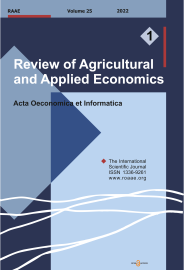KEYWORDS:
Dietary diversity, human capital, bicausality, rural Nigeria
DOI NUMBER:
10.15414/raae.2019.22.01.91-97
ABSTRACT:
Food security and human development are intricately linked and no meaningful progress can be sustained without an affiliated progress on the other. Fighting food insecurity therefore requires an increase in the level of human capital. However, food insecurity and low level of human capital development are major challenges among the rural milieu in Nigeria. The effect of human capital on food insecurity status among rural households in Nigeria was therefore investigated in this study. Principal Component Analysis was used to generate human capital index which comprised age, age squared, education, number of inactive days and body mass index of the household head. Household heads that had medium level of human capital were food secure. Human capital index, household size, being a male-headed household, membership of association, land ownership and access to extension significantly reduced food insecurity. Although human capital index had a negative effect on food insecurity, there was no bicausality between them.
Please Cite this Article as:
Oluwakemi OBAYELU, Abimbola ADEPOJU, Olukemi OMIRIN (2019) Does Human Capital Explain Food Insecurity Status Of Rural Households Or Vice-versa?. Review of Agricultural and Applied Economics. XXII (Number 1, 2019): 91-97. doi: 10.15414/raae.2019.22.01.91-97
URL for sharing:
https://roaae.org/1336-9261/doi/abs/10.15414/raae.2019.22.01.91-97
FULL TEXT PDF:
▼ direct download link| view online in fullscreen ▲
References:
▼ direct download link

